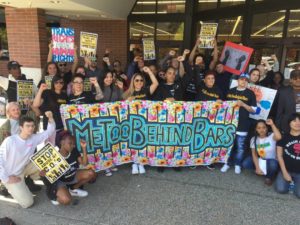
Photo by: The Young Women’s Freedom Center
The California state inmate population includes almost 5,000 women, among the 124,000 prisoners. Women inmates face sexual abuse by correctional officers. The California Department of Corrections and Rehabilitation fired at least six male correctional officers for sexually abusing women in their custody between 2014 and 2018. According to released records, the fired officers engaged in actions such as; groping the inmates, engaging in oral sex or intercourse, with the inmates.
However, according to California women inmates and inmate’s advocates, sexual abuse of women inmates is widespread in the state system.
The Prison Law Office, which monitors conditions for inmates, has interviewed hundreds of women at the California Central Valley prison and documented their complaints.
They reported in 2016 that out of a random sample of 80 women, almost all had experienced sexual abuse or harassment while imprisoned. A second round of interviews turned up similar complaints, often at the hands of the same officers. The reports indicated a culture of bigotry and sexism at the prison.
One former inmate, Amika Moto was incarcerated for nine years, for vehicular manslaughter, at the Central California Women’s Facility. She reported that she and other women inmates, endured sexual advances, because correctional officers controlled access to clean laundry, phone calls, tampons, time out of their cell and other basic needs.
Mota stated, “There’s not a bone in my body that ever felt attracted to any of these officers or felt like any of the words we spoke were true… “It was just this survival technique to play along.”
Most importantly, Correctional Officers had the power to cite inmates for violations, real or not, which could result in increasing a prison sentence.
Mota said, one officer, expected to see women without their clothes. “He would be really appreciative if during count we were in our bras. ” Mota never reported any harassment, because she feared retaliation. Mota explained, “What does it mean to feel constantly harassed, where they think it’s consensual and we think it’s not but we can’t ever say it?”
After her release in 2015, Mota joined the Bay Area-based Young Women’s Freedom Center. Now she is a advocate in the new movement, Me Too Behind Bars. The movement’s primary purpose– expose sexual abuse of people in prison and jail.
Women inmates throughout the United States endure sexual abuse.

By: Bradley Schwartz
Founder of prisonpath.com
Prison Consultant
Leave a Reply